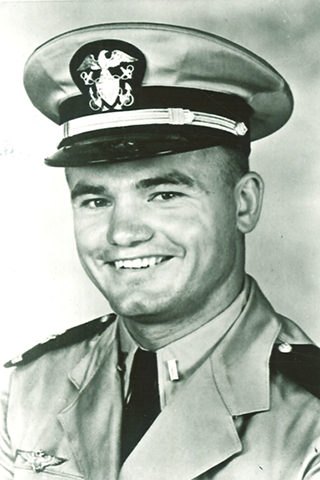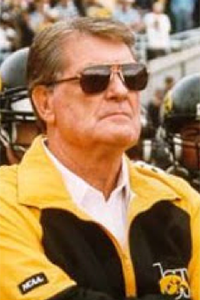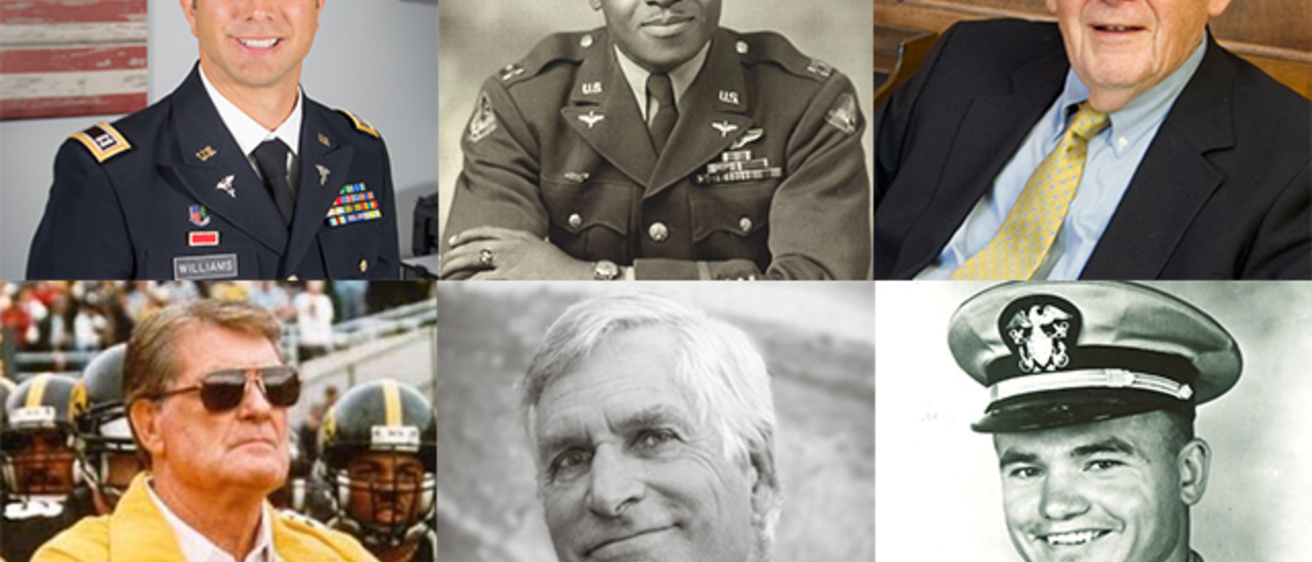The University of Iowa will honor six members of the armed forces for exceptional service to their country and the Hawkeye community on Wednesday, Nov. 15.
Hawkeye Distinguished Veterans Memorial Award ceremony
When: 5 p.m. Wednesday, Nov. 15
Where: Iowa Memorial Union, Main Lounge
The ceremony, which starts at 5 p.m., will be emceed by Iowa State Representative and UI Alumnus Todd Prichard of Charles City, Iowa, who is a lieutenant colonel with the Army Reserve. Criteria for the award include a strong university connection, to have served honorably, military accomplishment, and service to their community.
This year’s recipients of the Hawkeye Distinguished Veterans Memorial Award will be:
- Spc. 4 David Drake, U.S. Army
- Cpt. Luther Smith, U.S. Army Air Corps
- Cpt. Jeremy Williams, U.S. Army Reserves
- HM Willard L. “Sandy” Boyd, U.S. Navy
- ENS Nile Clarke Kinnick, Jr., U.S. Navy
- Cpt. Hayden Fry, U.S. Marine Corps
The event is sponsored by the UI Army ROTC and Air Force ROTC programs, the Division of Student Life/Iowa Memorial Union, UI Military and Veteran Student Services and the Hawkeye Distinguished Veterans Memorial Awards Committee.
Each award recipient also will be recognized with a plaque displayed in the Iowa Memorial Union, which was created to pay tribute to Iowans who served their country. The Memorial Honor Roll on the first floor of the IMU recognizes students and alumni who have given their lives in service to the nation as members of the armed forces.
More about the honorees:

David Drake was born in Dubuque, Iowa, and raised in Clinton, Iowa. He graduated from the University of Iowa with a BA in history and Latin and went on to attend Duke Law School before being drafted at the end of his third semester. Drake spent the next two years in the U.S. Army, where he served in Vietnam and Cambodia for most of 1970 with the 11th Armored Calvary Regiment–Blackhorse. When he returned to the U.S., he finished law school and worked as Chapel Hill’s assistant town attorney in North Carolina for eight years.
Though Drake had written some fiction during college, he started writing more seriously after returning from Vietnam and analyzed his experience using science fiction to distance himself from memories too tender for him to address directly. More or less by accident, Drake says this self-therapy (along with the work of two other veterans) helped create military science fiction as a publishing category. Drake says the education he received at the UI helped him survive in the Army, and has greatly informed his writing.

Luther Smith grew up in Des Moines, Iowa, and, by 1940, was one of few black pilots in the U.S. Because the Army Air Corps did not initially allow black pilots, he began studying engineering at the University of Iowa. In 1942, he was accepted into the Tuskegee Institute Flying Program.
Upon completing flight training, Smith deployed with the Tuskegee Airmen to Europe in support of the Allied bombing campaigns during WWII. His service with the 32nd Fighter Group included 133 combat missions within eight months. During his final mission, he suffered serious injuries and was a POW for seven months. Due to those injuries, he was forced to retire in 1947. After graduating from the UI with a BS in Mechanical Engineering in 1950, Smith went on to become the first African American aerospace engineer for General Electric and served the company for the entire 38-year span of his career.
Smith’s awards and commendations for his military service include the Distinguished Flying Cross, Air Medal with six Oak Leaf Clusters, Purple Heart, eight Theaters Campaign Ribbons and the Prisoner of War Medal.

Capt. Jeremy Williams’ 15-year army medic career and work in sports medicine instilled in him a strong desire to serve others. Having deployed to Kuwait to support the 2011 withdrawal from Iraq, he continues to seek new ways to serve others while completing a PhD in student affairs at the University of Iowa in 2018.
Williams says his role with the College of Education’s I-SERVE (Iowa-Support, Education, and Resources for Veterans and Enlisted) program was the opportunity of a lifetime. In two years as veterans resource specialist, he has served more than 500 student veterans/affiliates, created a veteran’s resource library, championed the Troops to Teachers program across the state, and facilitated multiple scholarship opportunities, all while commanding 270 Army Reserve soldiers. He never ceases to promote the value that student veterans bring to college campuses.

Willard L. “Sandy” Boyd was born in St. Paul, Minnesota. He attended the University of Minnesota before enlisting in the U.S. Navy, where he served as a hospital corpsman (pharmacist’s mate 3rd class) from 1945 to 1947. After his military service, Boyd continued his studies at the University of Minnesota earning a BSL and LLB (JD) and, later, at the University of Michigan where he earned a LLM and SJD in law.
Boyd came to the University of Iowa in 1954 as a law professor after a brief time in private practice in Minneapolis. He later served as the university’s 15th president from 1969 to 1981, when he left to become president of the Field Museum of Natural History in Chicago. After retiring from the Field Museum, he returned to the UI as a law professor in 1996 and served as interim president in from 2002 to 2003. Boyd retired in 2015 after more than 60 years at the UI. During his career, he was a staunch advocate for human rights by expanding opportunities for women and minorities in higher education and helping make public institutions accessible and accountable to diverse cultures.

Nile Clarke Kinnick, Jr. was born in Adel, Iowa. He began his college career at the University of Iowa in 1936 and graduated in 1939. While at the UI, Kinnick played basketball and baseball before focusing exclusively on football. During the 1939 season, Kinnick won the Big 10 MVP, Consensus First-Team All-American, AP Male Athlete of the Year, and various other awards. He was also elected student body president. In 1939, he became the first, and to this day, the only, Hawkeye to win the Heisman Trophy.
Upon graduation, Kinnick declined professional sports offers to attend the UI College of Law. He joined the U.S. Navy during WWII after one year of law school, stating at the time, “Every man whom I’ve admired in history has willingly and courageously served in his country’s armed forces in times of danger.” Kinnick died during a training flight off the coast of Venezuela in 1943. Kinnick Stadium was renamed in his honor in 1972.

Hayden Fry was born in Odessa, Texas, where he stood out as a multi-sport athlete. He attended college at Baylor University where he played football and received a degree in psychology. After a short period as a teacher and assistant football coach, Fry joined the U.S. Marine Corps. During his Marine service, he played for the Quantico Marines Football team, winning the Marine Corps Championship. He also had a chance to coach, which shaped his football coaching philosophy for many decades to follow.
After his military service, Fry served as the head coach at Southern Methodist University, North Texas State University, and the University of Iowa (1979 to 1998), compiling a career college football record of 232–178–10. Fry brought a winning tradition to the Iowa football program and established a legacy of assistant coaches becoming renowned head coaches in programs across the nation. He was inducted into the College Football Hall of Fame in 2003 and the Rose Bowl Hall of Fame in 2010.
To submit a nomination for this award, visit: https://imu.uiowa.edu/about/memorial/veterans-award/nomination-process/
